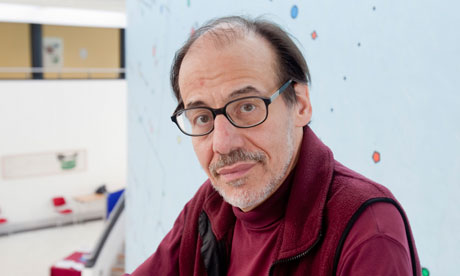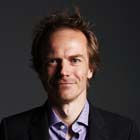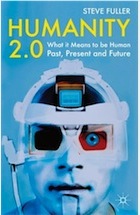The sociology professor says we are moving away from seeing ourselves as 'normal' humans as we increasingly embrace technological and medical advances – if we can afford them

Professor Steve Fuller, author of Humanity 2.0, at the University of Warwick. Photograph: Andrew Fox for the Observer
Steve Fuller holds the Auguste Comte chair in social epistemology in Warwick University's Department of Sociology. His new book, Humanity 2.0: What it Means to be Human, Past, Present and Future, is published by Palgrave Macmillan.
What do you mean by Humanity 2.0?
Humanity 2.0 is an understanding of the human condition that no longer takes the "normal human body" as given. On the one hand, we're learning more about our continuity with the rest of nature – in terms of the ecology, genetic make-up, evolutionary history. On this basis, it's easy to conclude that being "human" is overrated. But on the other hand, we're also learning more about how to enhance the capacities that have traditionally marked us off from the rest of nature. Computers come to mind most readily in their capacity to amplify and extend ourselves. Humanity 2.0 is about dealing with this tension.
In what areas have we reached 2.0 already?
Let's put it this way: we've always been heading towards a pretty strong sense of Humanity 2.0. The history of science and technology, especially in the west, has been about remaking the world in our collective "image and likeness", to recall the biblical phrase. This means making the world more accessible and usable by us. Consider the history of agriculture, especially animal and plant breeding. Then move to prosthetic devices such as eyeglasses and telescopes.
More recently, and more mundanely, people are voting with their feet to enter Humanity 2.0 with the time they spend in front of computers, as opposed to having direct contact with physical human beings. In all this, it's not so much that we've been losing our humanity but that it's becoming projected or distributed across things that lack a human body. In any case, Humanity 2.0 is less about the power of new technologies than a state of mind in which we see our lives fulfilled in such things.
Wouldn't someone like Archimedes describe us as Humanity 3.0 compared to his era?
Yes, Archimedes would probably see us as pretty exotic creatures. He would already be impressed by what we take for granted as Humanity 1.0, since the Greeks generally believed that "humanity" was an elite prospect for ordinary Homo sapiens, requiring the right character and training. Moreover, he would be surprised – if not puzzled – that we appear to think of science and technology as some long-term collective project of self-improvement – "progress" in its strongest sense. While the Greeks gave us many of our fundamental scientific ideas, they did not think of them as a blueprint for upgrading the species. Rather, those ideas were meant either to relieve drudgery or provide high-brow entertainment.
Is it desirable or possible to put the brakes on the move to 2.0?
Well here's my proviso: these developments do have the potential to create whole new deep class divisions, maybe not along the lines of the old industrial class divisions, but just as deep. Sometimes, people talk about this as the "knows" versus the "know-nots". Divisions open up along the lines of who has access to all of these potential enhancements. At the moment, the problem is that the state is dwindling away and it is becoming less of regulator of any kind of activity, so market forces are basically determining the development of all these things I'm talking about. And what that means is that the rich get access to them more quickly and the poor get left behind.
For example, in terms of the NHS, we don't deprive people of prosthetic enhancements such as hearing aids and eyeglasses along the lines of income, so we should be thinking about what other future enhancements we want people to have access to as part of being human 2.0.
Such as?
A good example would be cosmetic neurology, which is essentially plastic surgery for the brain. Where you go in every so often and you get a tune-up of your synapses. This is done at the University of Pennsylvania medical school.
What does this have to do with my daily life?
I think a lot. You already see the problem of smart drugs – people taking drugs to do well in exams or job interviews. The use of these substances is much more widespread than the official records indicate. People are taking the stuff and pretty soon people are going to feel they can't be left behind.
People who work within the disability sector talk about "able-ism" – the idea that we're going to be living in a world in the future where everyone will take having a disability as the normal state because you will never be doped up enough, you will always be worried about the next enhancement, about whether you have enough enhancement for your next job interview, or whether someone else has a smarter drug that you don't have access to. So people will feel that they have to somehow keep up. And that's a real issue, especially in an unregulated market environment.
So our ideas of what is normal change?
Yes, there does need to be wide-ranging discussion about what is means to be normal. To be in normal health – how does your brain or body have to function in order to be "normal"? We've had a fairly constant view of what normalcy is for quite a long time but I think we need to reopen this debate and then define the minimal requirements for medical care.
So you foresee an enhanced generation emerging because of their ability to take advantage of various drugs and treatments?
It's going to happen through individuals taking choices about getting treatments or not and then, within a generation or two, you'll start seeing interesting effects on society at large. What I can imagine is that life expectancy won't uniformly go up, it'll start to be bimodal distribution – some people will live beyond 100 and there'll be a large number of people who die under the age of 70. And that won't be because of some government mandate, that will be because people will definitely take advantage of the enhancements on offer, but others won't have those choices open to them.
Are you optimistic about Humanity 2.0?
We need to be always reminding ourselves that we have always been enhancing ourselves, that science has always been enhancing the human condition, that we have been trusting machines over our own bodies for at least 300-400 years now. We've already broken through that barrier – we do live in a very artificial world. Even though the stuff on the horizon may amplify our powers tremendously, it is nevertheless part of the same process. It is a step change but it's the same story, the story of scientific progress.
Humanity 2.0 is published by Palgrave Macmillan, £19.99. To buy it for £15.99 with free UK p&p, go to guardianbookshop.co.uk or call 0330 333 6847



No comments:
Post a Comment